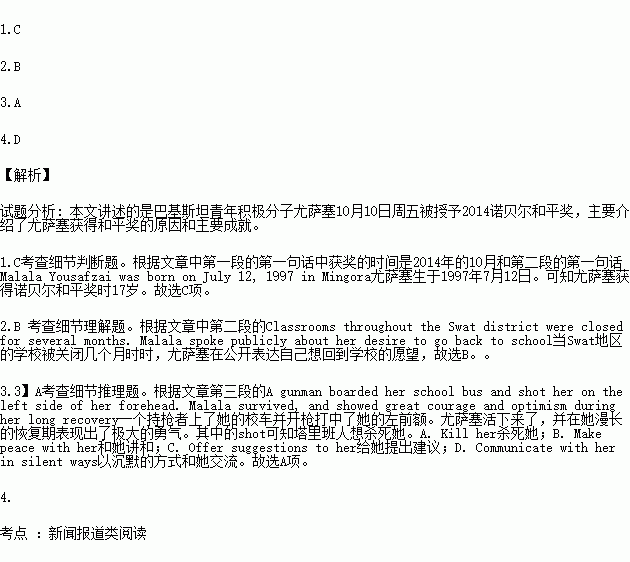题目内容
Pakistani youth activist Malala Yousafzai was awarded the 2014 Nobel Peace Prize on Friday, October 10. She is the youngest Nobel winner in history. Malala shares the prize with Kailash Satyarthi, a 60-year-old man from India who has helped lead a movement to end child slavery around the world.
Malala Yousafzai was born on July 12, 1997 in Mingora, the Swat District of northwest Pakistan to a Sunni Muslim family. When she was just 11 years old, she started blogging about the Taliban takeover of her hometown. Taliban members believe young girls should not go to school. Classrooms throughout the Swat district were closed for several months. Malala spoke publicly about her desire to go back to school. “All I want is an education,” she told one television broadcaster.
When the Pakistani government regained control, Malala was able to return to class. She continued to blog and speak out about girls’ right to education. But on October 9, 2012, the Taliban tried to silence her. A gunman boarded her school bus and shot her on the left side of her forehead. Malala survived, and showed great courage and optimism during her long recovery. Then she became a symbol of the struggle for girls’ rights all over the world.
Malala’s mission for peace is unstoppable. Nine months after she was shot, she gave a now-famous speech at the United Nations. “They thought that the bullets would silence us. But they failed,” she said. “And then, out of that silence came thousands of voice. Weakness, fear and hopelessness died. Strength, power and courage were born.”

1.How old was Malala when she won the Nobel Peace Prize?
A. 11 years old. B. 14 years old.
C. 17 years old. D. 60 years old.
2. After classrooms throughout the Swat district were closed, Malala ________.
A. started blogging about the event
B. expressed her desire for education publicly
C. made a now-famous speech at the UN
D. turned to famous television broadcasters for help
3.What does the underlined part silence her in the third paragraph probably mean?
A. Kill her.
B. Make peace with her.
C. Offer suggestions to her.
D. Communicate with her in silent ways.
4.What does the passage mainly tell us?
A. Malala’s peace mission.
B. Malala’s courage and optimism.
C. Malala’s fight with the Taliban.
D. Malala’s winning the Nobel Peace Prize.

